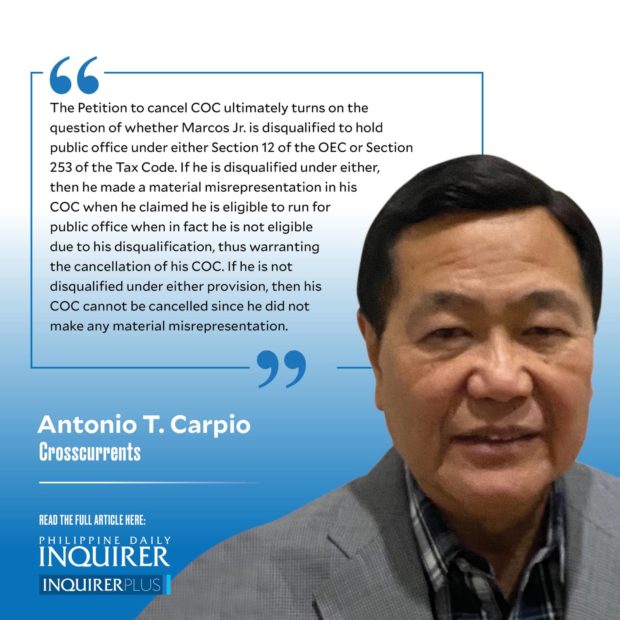Did Marcos Jr. serve his sentence?
The decision of the Court of Appeals (CA) convicting Ferdinand R. Marcos Jr. of criminal violation of the Tax Code became final and executory on Aug. 13, 2001. The fallo or dispositive portion of the Court of Appeals decision ordered Marcos Jr. “to pay to the BIR the deficiency income taxes” and “to pay a fine of P2,000.00 for each charge xxx for failure to file income tax return for 1982, 1983 and 1984; and a fine of P30,000.00 xxx for failure to file income tax return for 1985, with surcharges.”
Section 12 of the Omnibus Election Code (OEC) provides that any person convicted of a “crime involving moral turpitude shall be disqualified to be a candidate and to hold any public office.” Such disqualification is “removed xxx after the expiration of a period of five years from his service of sentence.” If the penalty is only payment of reparation and fine, the convict is deemed to have served his sentence upon payment of the reparation and fine. Since the CA decision ordered Marcos Jr. to pay reparation, which is the deficiency income tax, plus fine, the question arises if Marcos Jr. had paid the deficiency income tax and fine, and when.
In his Answer to the Petition to cancel his certificate of candidacy (COC), Marcos Jr. claims that the CA’s fallo “does not specify the particular deficiency income tax which appellant therein is required to pay.” In effect the Answer judicially admits that Marcos Jr. has not paid the deficiency income tax up to now. Moreover, while the Answer admits that the order to pay the fine, as distinguished from the deficiency income tax, is unambiguous, the Answer does not state that Marcos Jr. had paid the fine. Even assuming that Marcos Jr. did pay the fine, the failure to pay the deficiency income tax means he still has not served his sentence. Consequently, Marcos Jr.’s disqualification to run for public office remains in effect up to now.
Marcos Jr. cannot claim that the CA’s order does not specify the particular deficiency income tax because this deficiency, as stated in the CA decision, was the subject of a stipulation of facts between the prosecution and Marcos Jr. With the stipulation of facts, Marcos Jr. judicially admitted his liability to pay the deficiency income tax as stated in the stipulation of facts.
The Answer of Marcos Jr., however, raises the defense that the crime for which he was convicted does not involve moral turpitude because he was only fined for non-filing of income tax returns, which he asserts does not involve moral turpitude. Thus, Marcos Jr. claims he cannot be disqualified under Section 12 of the OEC which requires a crime involving moral turpitude. There are many reasons why the non-filing of income tax returns, particularly if done repeatedly over several years as in the case of Marcos Jr., constitutes moral turpitude. Moreover, the Petition to cancel Marcos Jr.’s COC also advances another separate and independent ground—that Marcos Jr. is “perpetually disqualified” to hold public office for conviction of “any crime” under the Tax Code.
Section 253 of the Tax Code mandates that a public officer shall be “perpetually disqualified from holding public office” if he is “convicted of any crime penalized by this Code.” It is immaterial whether or not the crime involves moral turpitude. It is also immaterial if the sentence has been served as the disqualification is perpetual. The Answer of Marcos Jr. is completely silent on this second separate and independent ground for his disqualification. Thus, the material averments in the Petition relating to this second ground, not having been specifically denied by Marcos Jr., are deemed admitted.
The Petition to cancel COC ultimately turns on the question of whether Marcos Jr. is disqualified to hold public office under either Section 12 of the OEC or Section 253 of the Tax Code. If he is disqualified under either, then he made a material misrepresentation in his COC when he claimed he is eligible to run for public office when in fact he is not eligible due to his disqualification, thus warranting the cancellation of his COC. If he is not disqualified under either provision, then his COC cannot be canceled since he did not make any material misrepresentation.
















